🔄 Quotes About Habits & Consistency (get 1% better every day)
Discover how getting 1% better every day eventually leads to massive, exponential improvement. These quotes from “Atomic Habits” by James Clear highlight the power of consistency and the compound effect of habits.
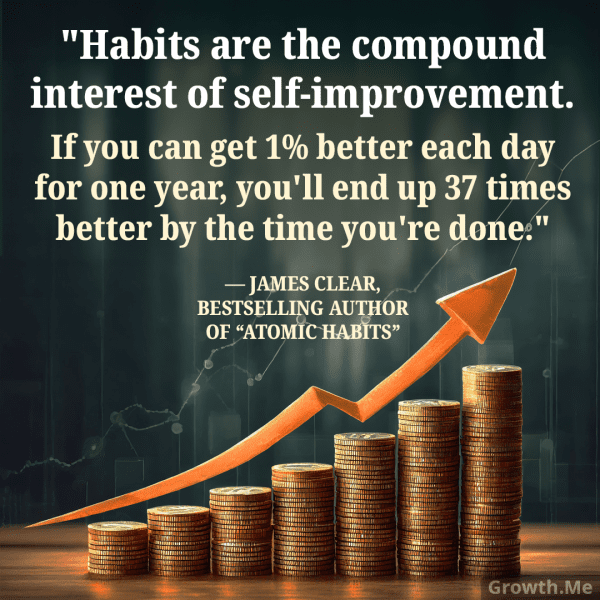
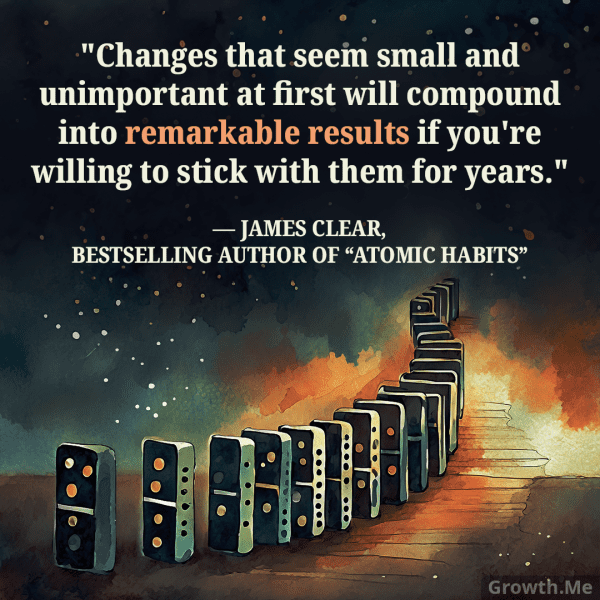
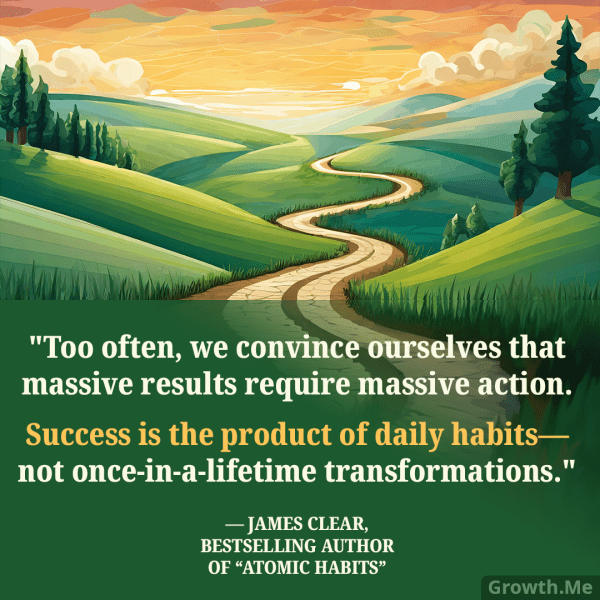
- “Habits are the compound interest of self-improvement. Getting 1 percent better every day counts for a lot in the long-run.” (pg. 28)
- “If you can get 1% better each day for one year, you’ll end up 37 times better by the time you’re done.” (pg. 15)
- “Changes that seem small and unimportant at first will compound into remarkable results if you’re willing to stick with them for years.” (pg. 7)
- “Too often, we convince ourselves that massive results require massive action.” (pg. 15)
- “Success is the product of daily habits—not once-in-a-lifetime transformations. ” (pg. 17)
- “An atomic habit refers to a tiny change, a marginal gain, a 1 percent improvement.” (pg. 27)
- “The holy grail of habit change is not a single 1 percent improvement, but a thousand of them. It’s a bunch of atomic habits stacking up.” (pg. 251)
- “Habits are the compound interest of self-improvement. The same way that money multiplies through compound interest, the effects of your habits multiply as you repeat them. They seem to make little difference on any given day and yet the impact they deliver over the months and years can be enormous. It is only when looking back two, five, or perhaps ten years later that the value of good habits and the cost of bad ones becomes strikingly apparent.” (pg. 16)
- “A single decision is easy to dismiss. But when we repeat 1 percent errors, day after day, by replicating poor decisions, duplicating tiny mistakes, and rationalizing little excuses, our small choices compound into toxic results.” (pg. 16)
- “Time magnifies the margin between success and failure. It will multiply whatever you feed it. Good habits make time your ally. Bad habits make time your enemy.” (pg. 18)
⚙️ Quotes About Systems & Goals
Explore the distinction between systems and goals, a key idea in “Atomic Habits.” Learn why focusing on the process is often more impactful than being fixated on the outcome.
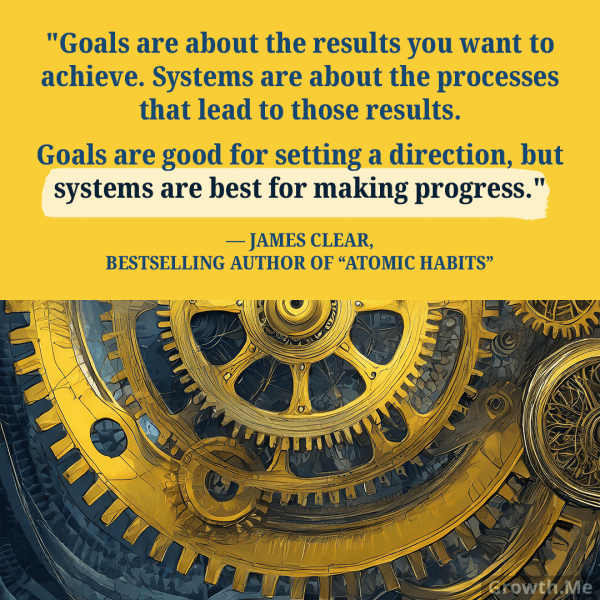
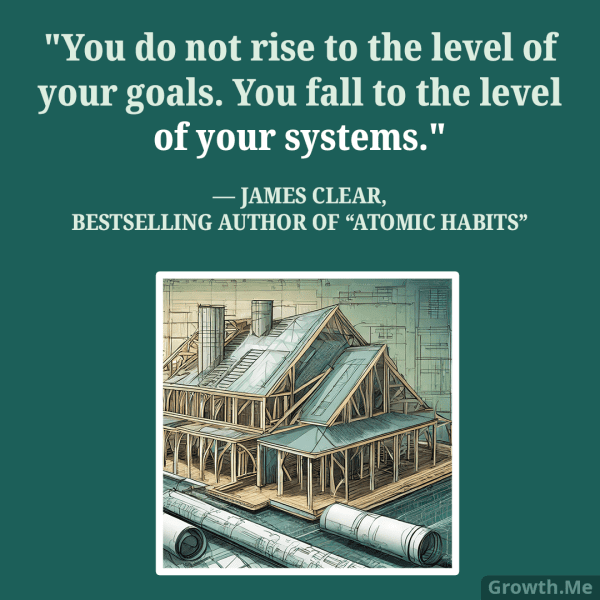
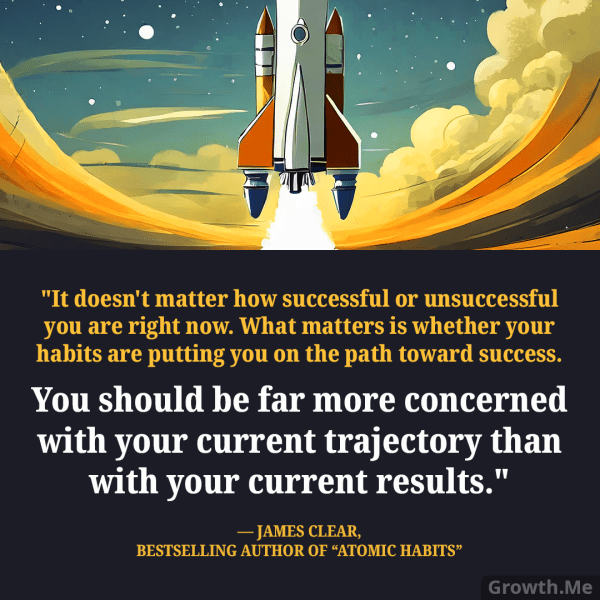
- “Goals are about the results you want to achieve. Systems are about the processes that lead to those results.” (pg. 23)
- “Goals are good for setting a direction, but systems are best for making progress.” (pg. 24)
- “You do not rise to the level of your goals. You fall to the level of your systems.” (pg. 27)
- “It doesn’t matter how successful or unsuccessful you are right now. What matters is whether your habits are putting you on the path toward success. You should be far more concerned with your current trajectory than with your current results.” (pg. 17)
- “The purpose of setting goals is to win the game. The purpose of building systems is to continue playing the game. True long-term thinking is goal-less thinking. It’s not about any single accomplishment. It is about the cycle of endless refinement and continuous improvement. Ultimately, it is your commitment to the process that will determine your progress.” (pg. 27)
- “Your outcomes are a lagging measure of your habits. Your net worth is a lagging measure of your financial habits. Your weight is a lagging measure of your eating habits. Your knowledge is a lagging measure of your learning habits. Your clutter is a lagging measure of your cleaning habits. You get what you repeat.” (pg. 18)
🔥 Quotes About Motivation & Identity
Uncover the deep connection between your habits, motivation, and identity. These quotes show that changing how you see yourself can be the most sure pathway to self improvement that lasts.
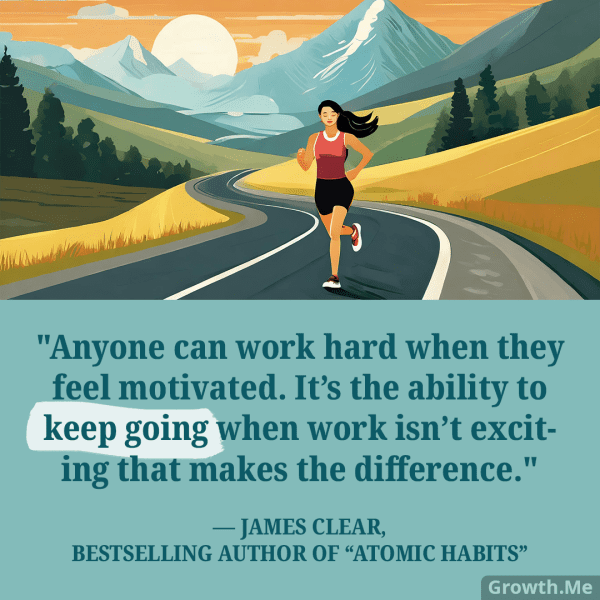
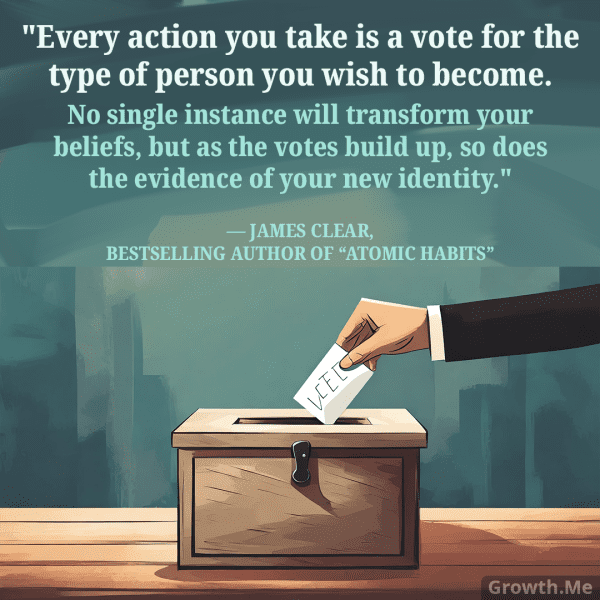
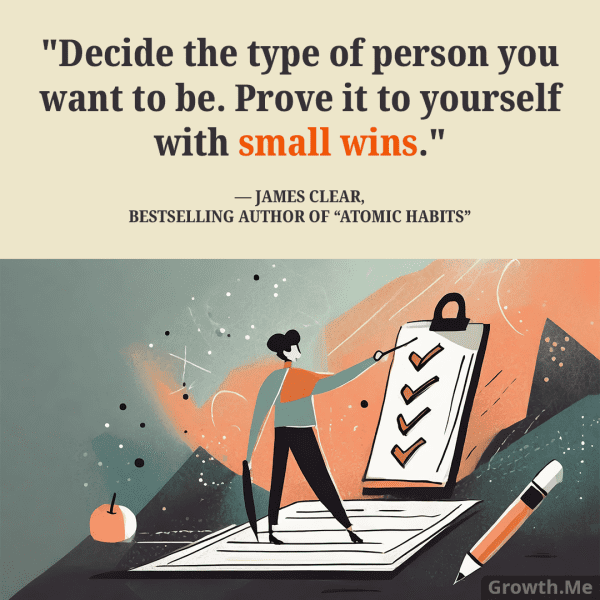
- “Anyone can work hard when they feel motivated. It’s the ability to keep going when work isn’t exciting that makes the difference.” (pg. 237)
- “Every action you take is a vote for the type of person you wish to become. No single instance will transform your beliefs, but as the votes build up, so does the evidence of your new identity.” (pg.37)
- “Decide the type of person you want to be. Prove it to yourself with small wins.” (pg. 39)
- “The most effective form of motivation is progress. When we get a signal that we are moving forward, we become more motivated to continue down that path. […] Each small win feeds your desire.” (pg. 198)
- “The ultimate form of intrinsic motivation is when a habit becomes part of your identity. It’s one thing to say I’m the type of person who wants this. It’s something very different to say I’m the type of person who is this.” (pg. 33)
- “The Goldilocks Rule states that humans experience peak motivation when working on tasks that are right on the edge of their current abilities.” (pg. 237)
- “Motivation is overrated, environment often matters more. […] You don’t have to be the victim of your environment. You can also be the architect of it.” (pg. 84)
🎯 Quotes About Behavior Change
Dive into some practical rules for changing your behaviour according to psychology. These quotes give some simple hacks from “Atomic Habits” that we can use to to break bad habits and form good ones.
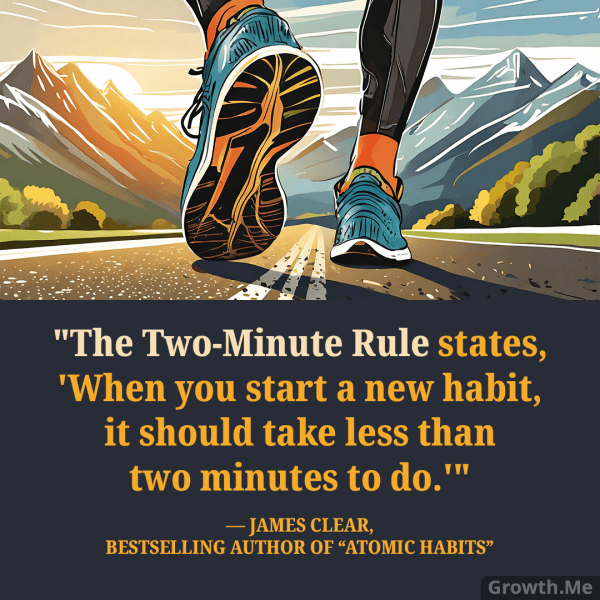
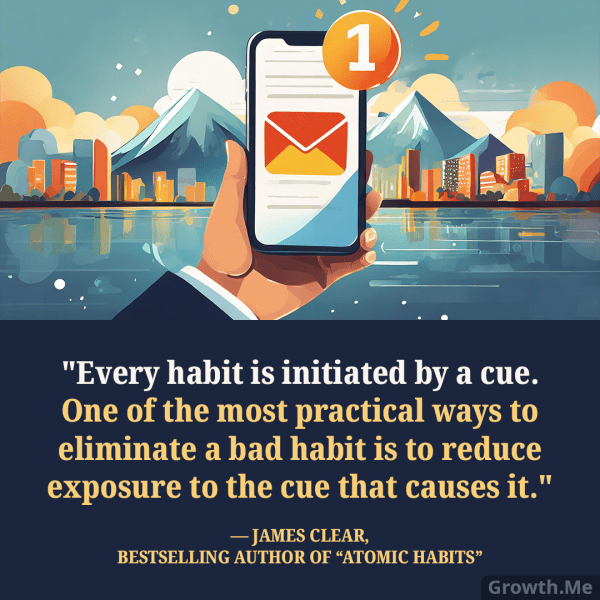
- “The Two-Minute Rule states, ‘When you start a new habit, it should take less than two minutes to do.'” (pg. 166)
- “Every habit is initiated by a cue.” (pg. 90)
- “One of the most practical ways to eliminate a bad habit is to reduce exposure to the cue that causes it.” (pg. 95)
- “The process of behavior change always starts with awareness. You need to be aware of your habits before you can change them.” (pg. 67)
- “The Four Laws of Behavior Change are a simple set of rules we can use to build better habits. They are (1) make it obvious, (2) make it attractive, (3) make it easy, and (4) make it satisfying.” (pg. 55)
- “The Cardinal Rule of Behavior Change: What is immediately rewarded is repeated. What is immediately punished is avoided. To get a habit to stick you need to feel immediately successful—even if it’s in a small way.” (pg. 193)
- “There are three levels of change: outcome change, process change, and identity change. The most effective way to change your habits is to focus not on what you want to achieve, but on who you wish to become.” (pg. 41)

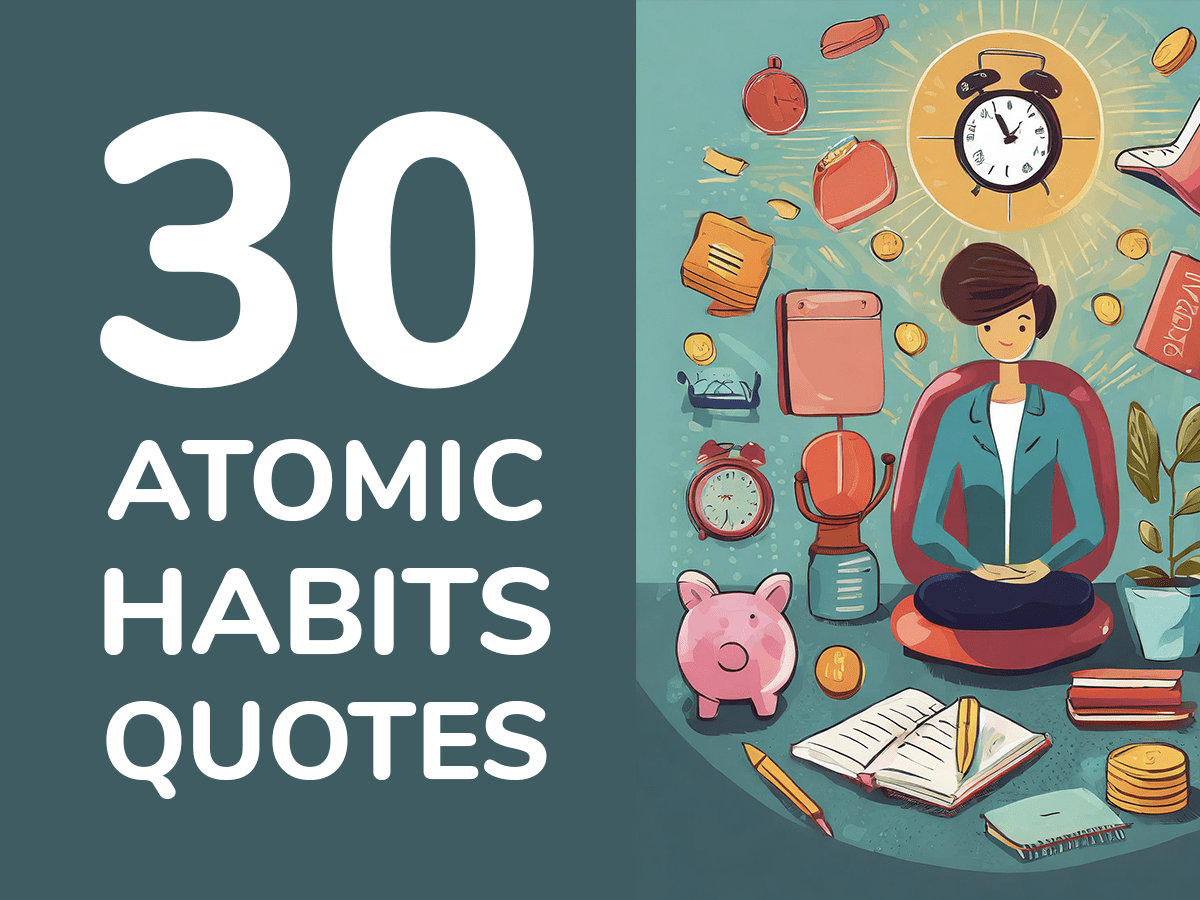
Community Notes